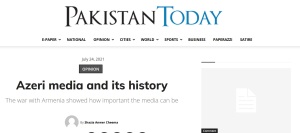“Only a credible national media can help its country whenever it is needed. If the National media does not enjoy credibility and is used for domestic purposes and for domestic consumption, then it is useless media and cannot fight internationally whenever it is needed forth”.
This is observed by writer Shazia Anwer Cheema in her article published in daily the Pakistan Today titled “Azeri media and its history”.
In her article she maintained that she found during her research on the role of media as a state war tool, the Azeri media refrained from indulging in crude propaganda during the Armenia-Azerbaijan War and provided a true picture of the war zone.
She believes that Azeri media provided information from the war zone in such a way that the world media, particularly European media outlets used this information from Azeri media outlets because the second option for European media was Armenian media but Armenian media was providing loaded information and crude propaganda material. Media is a big component of the war machine and if it has credibility then it can play an exceptionally positive role to place the narrative of a nation at a global level and this was what Azeri media achieved during the 44-days war.
Important observations of writer Shazia Cheema are hereunder:
My close interaction with Azeri media gives me a sense that Azerbaijani Media having a history of 146 years is very efficient and forthcoming regarding placing its version on global news. Azerbaijani Media portrays a realistic picture and unbiased situation analysis which of course adds credibility to any media. So far situation of the Karabagh was concerned, I followed the entire event with comparative studies of news coming from a war zone and found Azerbaijani media credible and clear in providing raw information. Azerbaijan news agencies took a lead and showed the world that manipulative information cannot work anymore.
Where freedom of expression was limited and censorship was a pronounced hurdle to portray and express the situation, comedy played a pivotal role to deliver a message against oppressors
The world is not ready to accept fake news, the audience is now informed enough that they can figure out twisted and tilted viewpoints that’s why people want to know the truth. Azerbaijani media not only presented their case earnestly but also with the help of other countries’ media outlets they make their case even stronger. During the entire period of war, Azeri media had been asking for authentic and research-based write-ups from foreign researchers like me, it seems their only concern was not defending their case but also they were eager to understand non- Azerbaijani viewpoint.
The professional maturity of Azeri media comes from its 146-year history that started on July 22, 1875, when the foundation of the first Azeri Language Newspaper “Akinchi”, was laid by the great enlightener and publisher Hasan bey Zardabi.
According to Azeri journalist and researcher Laman Ismayilova, Hasan bey Zardabi fought for the enlightenment of Muslims in the Caucasus and he faced several crises during two years of publication of his newspaper but he did not bow down to circumstances. The newspaper published materials on achievements in the fields of science, education, culture, literature, and art and declared the need for changes in the education system. Popular science articles on agriculture and natural sciences were published on its pages. There were also stories about the social and cultural state of Muslims in the Caucasus, which harshly criticized superstition and backwardness.
“The main principles of Akinchi were the enlightenment, modernization, promotion of national interests, unity of national and universal values,” writes Ismayilova.
Russo-Turkish War (1877–1878) had an adverse impact on emerging journalism in Azerbaijan and censorship was imposed against journalism, performing arts, and literature.
Theatre, drama, literature, and other forms of fine arts historically either influenced the socio-political sphere of their era or had been influenced by the political developments of the respective period and in societies, where freedom of expression was limited and censorship was a pronounced hurdle to portray and express about the situation, comedy played a pivotal role to deliver a message against oppressors therefore, we find several forms of comedies in writing, literature, drama, and theatre although Comedy is a humorous discourse and intend to amuse by creating laughter. Several forms of Comedy were used to express messages without being victims of oppression and censorship in Azerbaijan.
Several Azeri newspapers used the genre of Comedy for sending public messages for avoiding Czar’s censorship. Important newspapers such as Shergi-Rus (1903-1905), Hayat (1905-1906), Molla Nasreddin (1906-1931), Fuyuzat (1906-1907), Shalale (1913-1914), Igbal (1912-1915), Dirilik (1914-1916) and Achiq Soz (1915-1918) used the best weapon of sense of humor against injustice and snobbery.
The perfect example of using Comedy and satire under censorship was weekly “Molla Nasruddin”. The eight-page was a satirical magazine and it borrowed the name “Molla Nasreddin” from the 13th-century character Nasraddin who is known for comic but multi-meaning conversations. The magazine criticized corruption, snobbery, ignorance and promoted equal rights for women as well as freedom of expression and preservation of national language and traditions.
“Molla Nasreddin” also addressed uneducated people and used satirical verses, stories, and cartoons to convey its messages to society. The magazine was banned several times in 1912, 1914, and 1917. Despite all hardships, the publication managed to stay in print for over 25 years (1906-1931). However, Azeri thought and Azeri identity survived under the Soviet era because Azeri writers and journalists contributed with a clear goal of preserving national identity under subjugation. This history of Azeri media gives us a message that media can only be useful as a state tool during conflict times or under war situations when it has credibility at the international horizon and this credibility can earn only through the independence of media by the state powers.
Pakistani media and state can learn a lot from the Azeri model and media to media interaction between Pakistan and Azerbaijan can be very useful for both the countries. I believe that if media does not enjoy credibility and is used for domestic purposes and for domestic consumption then it is useless media and cannot fight internationally whenever it is needed for.
 The writer Shazia Cheema is an analyst writing for national and international media outlets. She heads the DND Thought Center. She did her MA in Cognitive Semiotics from Aarhus University Denmark and is currently registered as a Ph.D. Scholar of Semiotics and Philosophy of Communication at Charles University Prague
The writer Shazia Cheema is an analyst writing for national and international media outlets. She heads the DND Thought Center. She did her MA in Cognitive Semiotics from Aarhus University Denmark and is currently registered as a Ph.D. Scholar of Semiotics and Philosophy of Communication at Charles University Prague






